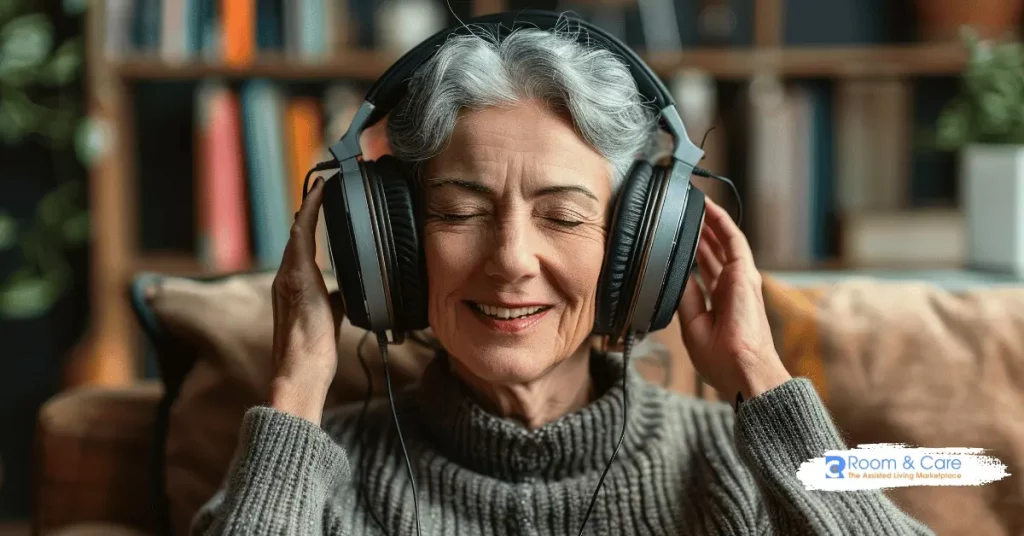

As we age, maintaining both mental and physical well-being becomes increasingly important. Among the many therapeutic methods available to support senior health, music therapy has emerged as a powerful and effective tool. The benefits of music therapy extend far beyond simple enjoyment; this holistic approach has proven to enhance cognitive function, emotional health, and social connections, making it particularly valuable for older adults living in senior care communities like assisted living facilities, nursing homes, and adult family homes.
In this article, we’ll explore the benefits of music therapy for seniors, providing a comprehensive guide on how it can be integrated into care plans, enhance quality of life, and promote well-being. We’ll also cover practical tips for caregivers, address common questions, and help you understand why this approach is becoming a staple in senior care settings.
Music therapy is a clinical and evidence-based use of music interventions to accomplish individualized goals within a therapeutic relationship by a credentialed professional. Unlike passive listening, music therapy involves active engagement through singing, playing instruments, writing songs, and guided listening. Each session is customized to meet the emotional, cognitive, and physical needs of the senior.
The use of music as a therapeutic tool is rooted in its ability to connect with individuals on a deep, emotional level. Music therapy is especially beneficial for seniors because it can stimulate the brain, reduce stress, improve physical health, and foster social connections—all essential components for aging well. In senior living communities, where mental and physical health challenges are common, the benefits of music therapy are particularly profound.
One of the most significant benefits of music therapy is its ability to stimulate cognitive function, especially in seniors with Alzheimer’s disease or other types of dementia. Research has demonstrated that music can engage multiple brain regions simultaneously, enhancing neural connections and promoting cognitive resilience.
For example, a study published in the Journal of Music Therapy found that seniors with mild to moderate dementia who participated in regular music therapy sessions showed improved memory recall, attention, and communication skills. Music therapy can awaken dormant memories and help seniors maintain their cognitive abilities longer.
Many seniors struggle with anxiety and depression due to changes in their health, loss of loved ones, or feelings of isolation. Music therapy can serve as a natural remedy to alleviate these emotional burdens. The rhythmic and melodic elements of music have been shown to reduce the production of cortisol, the stress hormone, and increase dopamine, the “feel-good” hormone.
Participating in music therapy sessions can also provide a sense of purpose, accomplishment, and connection. In senior living communities, group music therapy sessions often create a welcoming space where residents can express themselves, share experiences, and form bonds with others.
Pain management is a critical concern in senior care, especially for those with chronic conditions like arthritis, neuropathy, or osteoporosis. Music therapy offers a non-pharmacological alternative for pain relief. Studies have shown that listening to music can reduce pain perception by distracting the mind, altering pain pathways, and releasing endorphins, the body’s natural painkillers.
Music therapy sessions may include relaxation exercises, rhythmic movements, or guided imagery paired with soothing music to help seniors manage their pain more effectively. This approach is particularly beneficial for those who may be sensitive to pain medications or who prefer natural methods of pain relief.
Music therapy is also highly effective in promoting physical rehabilitation. Seniors who participate in activities like drumming, dancing, or playing simple musical instruments can improve their motor skills, coordination, and overall physical strength. The rhythmic patterns in music can help synchronize movement, making physical therapy exercises more enjoyable and engaging.
For example, in a study conducted by the American Journal of Physical Medicine & Rehabilitation, seniors undergoing physical rehabilitation for stroke recovery showed significant improvements in gait and balance when music therapy was integrated into their routines. The repetitive and engaging nature of music provides a motivating backdrop for exercise, helping seniors stay active and fit.
Social isolation is a common issue among seniors, particularly those who live in care facilities or far from family. Music therapy can help break down social barriers and foster meaningful connections. Group music therapy sessions, such as sing-alongs, drumming circles, or music appreciation classes, encourage interaction, collaboration, and shared experiences.
In senior living communities, these activities are more than just entertainment—they are crucial for building a sense of community and reducing feelings of loneliness. Participating in music therapy can help seniors make new friends, strengthen existing relationships, and feel more connected to those around them.
Seniors often experience a wide range of emotions, from joy and nostalgia to frustration and grief. Music therapy provides a unique, non-verbal way for seniors to express their emotions, particularly for those who may find it difficult to articulate their feelings verbally due to cognitive decline or speech impairments.
Through activities like songwriting, improvisation, or playing an instrument, seniors can express complex emotions in a supportive environment. This creative outlet can be especially valuable in memory care settings, where verbal communication is often challenging, but emotional needs remain strong.
Sleep disturbances are common among older adults, affecting their overall health and quality of life. Music therapy can improve sleep quality by promoting relaxation and reducing anxiety. Listening to calming music before bedtime has been shown to improve sleep duration and quality in seniors with insomnia or sleep disorders.
By incorporating music therapy into a bedtime routine, caregivers can help seniors establish a more restful sleep pattern. This non-invasive approach can be particularly beneficial in settings like assisted living facilities or nursing homes, where sleep quality often impacts the overall well-being of residents.

When incorporating music therapy into a senior’s care plan, it is crucial to start with a personalized approach. Begin by understanding the senior’s musical preferences, cultural background, and any specific memories associated with certain songs or genres. Tailoring the music therapy sessions to their likes and dislikes will make the experience more engaging and effective.
The environment plays a significant role in the effectiveness of music therapy. In senior living communities, music therapy sessions can be conducted in communal spaces, allowing for group interaction, or in private settings for more focused, individualized sessions. Consider the senior’s comfort and the goals of the therapy when choosing the setting.
To maximize the benefits of music therapy, work with certified music therapists who have experience working with seniors. These professionals are trained to create therapeutic plans tailored to the unique needs of older adults. They can also provide guidance on integrating music therapy into a comprehensive care plan that includes other therapeutic modalities.
With advancements in technology, incorporating music therapy into a senior’s routine has never been easier. Tools like music streaming apps, digital playlists, and smart speakers can help create a personalized musical environment at any time. Many senior living communities are now using technology to deliver music therapy sessions remotely, providing flexibility and accessibility for all residents.
Music therapy can be effective for most seniors, but its impact may vary depending on individual needs and preferences. Some seniors may respond better to familiar songs, while others may enjoy exploring new music. It’s essential to personalize the therapy to the individual’s tastes and be patient, as the benefits may take time to manifest.
While music therapy offers many benefits, it is not a substitute for medical treatments or other necessary therapies. Instead, it should be viewed as a complementary therapy that can enhance traditional treatment plans. For instance, it can be used alongside medication, physical therapy, or psychological counseling to provide a more holistic approach to senior care.
If your loved one enjoys music or has shown a positive response to music in the past, they may benefit from music therapy. Speak with healthcare providers, caregivers, or a certified music therapist to determine if it could be a suitable addition to their care plan. Look for signs of engagement, mood improvement, and social interaction to gauge its effectiveness.
Senior living communities interested in incorporating music therapy should start by creating a structured program that outlines the types of activities offered, session frequency, and the goals for each resident. Collaboration with certified music therapists is essential to ensure the program is therapeutic and effective.
To maximize participation and engagement, involve residents and their families in the planning and implementation process. Offer demonstrations or introductory sessions to show the benefits of music therapy, and gather feedback to tailor the program to residents’ interests and preferences.
Regularly evaluate the success of the music therapy program by tracking residents’ progress, engagement levels, and overall well-being. Adjust the program as needed based on this feedback, and remain flexible to changing needs and preferences.

To further illustrate the transformative power of music therapy, here are several evidence-based studies that highlight its benefits in senior care:
A study published in the Journal of the American Geriatrics Society examined the effects of music therapy on 89 elderly residents with dementia across multiple care facilities. The study found that music therapy sessions, which included singing familiar songs, significantly reduced agitation and improved social interaction among participants. The findings suggest that even in advanced stages of cognitive decline, music therapy can enhance communication and foster emotional connections.
Research published in Frontiers in Neurology focused on the benefits of music therapy for individuals with Parkinson’s disease. In a controlled trial involving 40 patients, music therapy sessions that incorporated rhythmic exercises and movement-based activities were shown to improve motor function, reduce tremor severity, and enhance mood. The study concluded that rhythm-based music therapy could be a valuable adjunct therapy in managing the physical and emotional symptoms associated with Parkinson’s disease.
The Journal of Alzheimer’s Disease published a study exploring the effects of personalized music playlists on residents in memory care units. The study involved 60 participants with moderate to severe Alzheimer’s disease, who were given personalized playlists based on their past musical preferences. Over a 12-week period, participants who listened to these playlists daily exhibited fewer episodes of agitation, improved mood, and increased verbal communication compared to the control group. These findings highlight the potential of tailored music therapy to improve quality of life for those with memory-related conditions.
A systematic review published in Aging & Mental Health analyzed multiple studies on the effects of music therapy on the emotional well-being of older adults. The review found consistent evidence that music therapy reduces symptoms of anxiety and depression, particularly in seniors living in long-term care settings. The therapeutic use of music was shown to increase positive emotional experiences and provide a sense of comfort and relaxation, enhancing overall mental health and quality of life.
A study published in the Journal of Pain and Symptom Management examined the role of music therapy in managing chronic pain among elderly patients in palliative care. The study included 84 participants who received weekly music therapy sessions. Results indicated a significant reduction in self-reported pain levels and an improvement in emotional well-being. The study demonstrated that music therapy could serve as an effective non-pharmacological approach to pain management in seniors, providing relief while avoiding potential side effects of medications.
The benefits of music therapy for seniors are diverse, encompassing cognitive, emotional, physical, and social dimensions. Whether living in a nursing home, assisted living facility, adult family home, or memory care community, seniors can greatly benefit from the healing power of music. By incorporating music therapy into care plans, caregivers and healthcare professionals can help seniors enjoy a better quality of life, enhanced well-being, and stronger social connections.
If you’re considering music therapy for a loved one or exploring senior care options, take the time to explore various resources and consult with professionals who specialize in senior care. At Room and Care, we connect you directly to the best-assisted living facilities, adult family homes, memory care facilities, nursing homes, and independent living communities without any referral fees or middlemen, ensuring you find the care that meets your needs and budget.